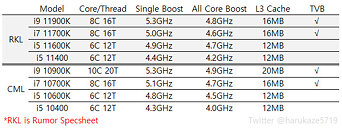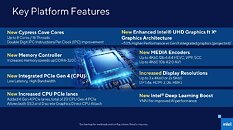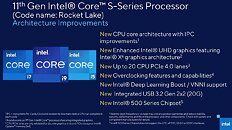Monday, December 14th 2020

Intel Core i9-11900K "Rocket Lake" Boosts Up To 5.30 GHz, Say Rumored Specs
Intel's upcoming 11th Generation Core i9-11900K processor boosts up to 5.30 GHz, according to rumored specs of various 11th Gen Core "Rocket Lake-S" desktop processors, sourced by Harukaze5719. According to this specs-sheet, both the Core i9-11900K and the Core i7-11700K (i7-10700K successor) are 8-core/16-thread parts, and clock-speeds appear to be the only apparent product segmentation between the two. The i9-11900K has a maximum single-core boost frequency of 5.30 GHz, and 4.80 GHz all-core boost. The i7-11700K, on the other hand, has an all-core boost of 4.60 GHz, and 5.00 GHz single-core boost. This time around, even the Core i7 part gets Thermal Velocity Boost.
11th Gen Core i5 continues to be 6-core/12-thread, with Intel allegedly readying an unlocked Core i5-11600K, and a locked i5-11400. Both parts lack TVB. The i5-11600K ticks up to 4.90 GHz single-core, and 4.70 GHz all-core; while the i5-11400 does 4.20 GHz single-core, and 4.40 GHz all-core. The secret-sauce with "Rocket Lake-S" is the introduction of the new "Cypress Cove" CPU cores, which Intel claims offer a double-digit percent IPC gain over the current-gen "Comet Lake," an improved dual-channel DDR4 memory controller with native support for DDR4-3200, a PCI-Express Gen 4 root-complex, and a Gen12 Xe-LP iGPU. The "Cypress Cove" CPU cores also feature VNNI and DLBoost, which accelerate AI DNN; as well as limited AVX-512 instructions. The 11th Gen core processors will also introduce a CPU-attached M.2 NVMe slot, similar to AMD Ryzen. Intel is expected to launch its first "Rocket Lake-S" processors before Q2-2021.
Sources:
harukaze5719 (Twitter), VideoCardz
11th Gen Core i5 continues to be 6-core/12-thread, with Intel allegedly readying an unlocked Core i5-11600K, and a locked i5-11400. Both parts lack TVB. The i5-11600K ticks up to 4.90 GHz single-core, and 4.70 GHz all-core; while the i5-11400 does 4.20 GHz single-core, and 4.40 GHz all-core. The secret-sauce with "Rocket Lake-S" is the introduction of the new "Cypress Cove" CPU cores, which Intel claims offer a double-digit percent IPC gain over the current-gen "Comet Lake," an improved dual-channel DDR4 memory controller with native support for DDR4-3200, a PCI-Express Gen 4 root-complex, and a Gen12 Xe-LP iGPU. The "Cypress Cove" CPU cores also feature VNNI and DLBoost, which accelerate AI DNN; as well as limited AVX-512 instructions. The 11th Gen core processors will also introduce a CPU-attached M.2 NVMe slot, similar to AMD Ryzen. Intel is expected to launch its first "Rocket Lake-S" processors before Q2-2021.



52 Comments on Intel Core i9-11900K "Rocket Lake" Boosts Up To 5.30 GHz, Say Rumored Specs
The i9 - 10900K still looks better, and also boosts to 5.3GHz.
This time, I'm really hoping the top 8 core part will not cross the 400$, giving this series a chance to be sold properly.
That said, I don't think anything "Core i9" will allow itself to sell for that cheap, so here goes that.
Anyway I wanna see what this new i9 will offer.
www.tomshardware.com/news/cyberpunk-2077-amd-ryzen-performance-bug-fix-testing?fbclid=IwAR3QSX97YpumXRwPi5QhOzLmdTruVxqxvufWUvwXsRCHQifhQ9lek3CI6ts
Not saying Intel will not perform, but if you are a gamer in 2020, Im pretty sure AMD will not be behind i unless you are the type of person that insist on 1080p and low textures on CB2077 :D (In other words; any realistic usecase Intel will not win anything.) :0
I think @fancucker doesn't game on Intel either, he bought a console long ago, and is just shouting for giggles. I'm having fun at least, you can't gather that much stupidity on your own.
This is why Lisa Su focused so much on APUs early on. By not having an iGPU, the desktop class Zen is effectively capped at something under 30% of the client market. I'm also certain this is why the Ryzen Pro line came out, which are basically desktop class APUs. If AMD ever hopes to go much beyond its current ~20% market share, it will need to have more iGPU systems, not less.
The majority of users don't give a rat's about GPU performance. For those folks, Intel makes a ton of sense. You can make smaller, quieter, less power hungry and perfectly functional systems. Just look at how big the All-in-one market is now.
When Intel will be replacing its 10-core i9-10900k with an 8-core i9-11900k, it's going to be better, despite having fewer cores. People needs to stop fixating on specs and focus on relevant benchmarks.
If a hypothetical quad core beat any 8 or 12 core on the market, wouldn't you want to buy it?Then I got to ask, why?
For the mainstream market, 8 cores is going to be plenty for a long time.
Most power users, content creators, developers, etc. who actually benefits from more than 8-cores generally want other features as well, such as more PCIe lanes for SSDs etc. I would argue it would be better if both AMD and Intel capped their mainstream platform at 100W and 8 cores (for now), and moved their 12+ cores to their respective HEDT platforms, instead of AMD starting their Threadrippers on 24 cores.